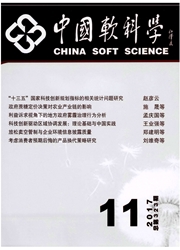

 中文摘要:
中文摘要:
本文从企业技术效率和健康资本的角度,利用随机前沿生产函数估计了地市级企业技术效率,基于联立方程组检验了环境公共走出与经济增长之间的作用和传导机制。研究结论表明中国环境公共支出中用于科研等技术开发性资助支出较少,没有对企业的技术效率创新提供良好的外部条件;现阶段中国环境规制水平普遍偏弱,制度质量和环境公共支出规模未能形成有效的外部创新激励,预期中的“波特假说”效应并不显著。但是,受益于地方政府环境公共环境支出的外溢性效应,居民健康资本不断积累,有效提高了人力资本从而促进了经济增长。
 英文摘要:
英文摘要:
By explaining from the technology efficiency perspective, we firstly figured it out by applying with the sto-chastic model, and then explained how the environmental expenditure affected the economic growth by using simultane- ous model. The results showed that the public R&D in environment expenditure is kind of small to create satisfactory ex-ternal conditions for innovation. The institution quality and the expenditure scale are not good enough to encourage the technological efficiency increase, which finally hampered the economic growth. The "Porter Hypothesis" does not show obvious in China, which is finally not helpful to economic growth. However, the environmental expenditure is helpful when considering the health capital, which improved the economic growth finally. We suggest increasing the environ-mental expenditure to overcome the point of U - shaped curve, reflecting the relationship between environmental expend- iture and economic growth.
 同期刊论文项目
同期刊论文项目
 同项目期刊论文
同项目期刊论文
 期刊信息
期刊信息
